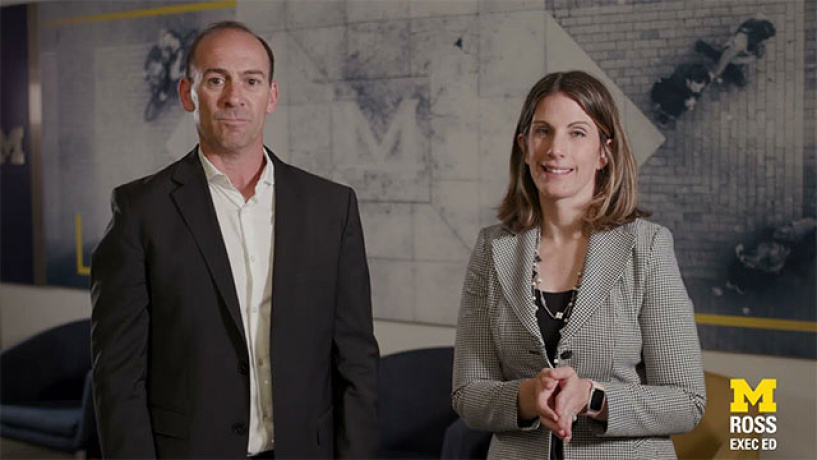Meeting Demands of the Digital Era Through Executive Education

Technology has had a significant impact on businesses in recent years. Advancements in areas such as artificial intelligence, data analytics, cloud computing, and the Internet of Things have transformed the way businesses operate, communicate, and engage with their customers.
With increased automation and digitalization, businesses can now optimize their processes, improve productivity, and reduce costs. Moreover, technology has enabled businesses to access a global market, connect with customers in new and innovative ways, and offer personalized experiences. However, the rapid pace of technological change also presents new challenges for businesses, such as the need to upskill their workforce and stay ahead of the competition. These challenges present a unique opportunity at the intersection of business and education, where executive education providers are able to not only reimagine business models to leverage technological advancements but also adapt curricula to reflect the evolving digital landscape, effectively preparing business leaders to thrive in the digital age.
Expert faculty at the Ross School of Business are putting themselves and working professionals at the forefront of the digital era by integrating the necessary framework for digital innovation, strategy, and AI methodology-backed research across executive education curricula. Recent efforts include the incorporation of the new Human Capability framework, developed by faculty director Professor Dave Ulrich and powered by Amazon Web Services, into the acclaimed Advanced HR Executive Program offered by Michigan Ross, providing learners with a powerful new approach to generating value through HR. The latest research behind the framework utilized machine-learning methodology to demonstrate and examine the impact of human capability scores on factors such as employee productivity and cash flow for over 5,700 organizations, advancing accuracy and impact nearly two-fold in comparison to previous studies that relied on traditional survey methodology. Supplemental to HR-focused programs, Michigan Ross has also strategically innovated executive education programs focused on leadership, management, and other key learning areas, enabling organizations to understand and proactively address the impact of modern technology on every facet of business.
In 2022, Michigan Ross Executive Education faculty directors Professor Lindy Greer and Professor Dave M Mayer redesigned the popular Leading High-Performance Teams program, now Leading Future-Ready Teams, to address new forces affecting team leaders, including the integration of technological advancements and effective tools to manage hybrid or remote teams. Programs such as this are imperative to educating team leaders on how to better lead their teams in the digital age because it helps them to build and maintain effective communication and collaboration strategies that are critical for success in a remote or hybrid work environment. Additionally, team leaders who understand how to leverage digital tools and technologies can more effectively manage and motivate their teams, leading to improved productivity and outcomes.
Professor Marcus Collins, a seasoned marketing executive, provides participants in Ross Executive Education with a digital perspective on understanding culture in order to move people in a new program planned to launch in Fall 2023. With new technologies accelerating the speed at which culture changes and people broadly living large aspects of their lives online, Collins will leverage the power of netnography to help executives understand how culture is shifting in real time with the influence of social media and as globalization continues to proliferate in the business ecosystem. For executive learners at Ross seeking to gain a deeper understanding of how emerging technologies can catalyze organizational growth, the Digital Transformation and Innovation program, thoughtfully offered online, lays out practical tools and frameworks to use fourth industrial revolution technologies to gain a competitive edge, including artificial intelligence, application programming interfaces, big data, data security, and others.
To expand the reach of digital transformation-driven education, Michigan Ross partnered with Warwick Business School to co-create and deliver the “Strategic Cloud Business Innovation and Cyber Risk-managed Value Creation” custom program to MBA students at Warwick in May 2023. The program featured faculty director and Ross Professor of Marketing, Venkat Ramaswamy, Ross Professor of Technology & Operations M.S. Krishnan, and University of Michigan Vice President for Information Technology and Chief Information Officer Dr. Dr. Ravi Pendse. "The Ross-WBS program on digitally transforming value creation through risk-managed strategic cloud business innovation explored new pathways at the intersection of technology, ecosystems, platforms, engagements, impacts, and experiences,” said Professor Ramaswamy.
The unique program puts the spotlight on enterprises collaborating effectively with customers, partners, employees, and stakeholders.
Executive education participants at Michigan Ross don’t just learn about the latest technological innovations shaping the way business is done; they also get the opportunity to experience it firsthand. Unveiled earlier in 2023, the new state-of-art Convatec digital reality studio at Michigan Ross benefits both online executive learners and online MBA students, where they will be fully immersed in a digital classroom community. Augmented reality capabilities, three robot-controlled cameras, and high-resolution LED screens, among other new features added to the studio, allow participants to experience a seamless and highly engaging learning experience during live program sessions. For executive learners who prefer a flexible, self-paced online program format, the Maximizing Your Influence and Persuasion program from Michigan Ross features a propriety simulation developed by Professor Maxim Sytch. The simulation allows learners to observe and learn in over 30 exercises to recognize influence techniques in a simulated business meeting and understand their effectiveness. Participants then get to practice their influence skills in action and provide an actual negotiation response to different sets of challenges on video, which will then be evaluated, making for a robust and highly personalized learning experience.
MBA students at Michigan Ross, prime future candidates for executive education programs, also benefit from innovative learning simulations. Professor Mike Barger, co-Founder of JetBlue Airways and a former Chief Instructor at the U.S. Navy’s TOPGUN school, teaches Crisis Leadership to second-year MBAs. The High-Stakes Leadership course, one of the most popular in the program, creates immersive classroom experiences where students roleplay senior executives who have recently led an organization through an actual business crisis. In their simulated executive roles, participants lead an hour-long press conference to engage members of key stakeholder groups who have been impacted by the crisis. Fellow classmates in the course add to the realism by roleplaying members of these groups. Later in 2023, in partnership with University of Michigan’s Center for Academic Innovation, Professor Barger will release a virtual reality version of the course, where learners all over the world will have an opportunity to become operational leaders at an airline experiencing a winter storm crisis. In this immersive simulation, participants will be able to interact virtually with customers, employees, investors, members of the media, and others to experience and experiment with leadership where it matters most.
The business landscape as the world knows it is shifting under our feet, and with technological advancements evolving exponentially, it’s candidly an exciting but critical time where those who don’t adapt accordingly risk falling behind the competition. With these advancements come unprecedented changes that will require careful attention and education. For example, are you able to tell which parts of this article were written by ChatGPT and which were written by our staff writer? Business education providers will continue to play a fundamental role in ensuring that these rapid technological developments are not only reflected in course curricula but that they are also being used to their full potential to deliver engaging learning experiences to business leaders across the globe. With these new technologies come new opportunities, and Michigan Ross is eager to continue innovating executive education programs among other areas, and exploring new technologies to meet and understand the evolving demands of the new digital age.
Answer Key - The following passages were written by ChatGPT:
“Technology has had a significant impact on businesses in recent years. Advancements in areas such as artificial intelligence, data analytics, cloud computing, and the Internet of Things have transformed the way businesses operate, communicate, and engage with their customers. With increased automation and digitalization, businesses can now optimize their processes, improve productivity, and reduce costs. Moreover, technology has enabled businesses to access a global market, connect with customers in new and innovative ways, and offer personalized experiences. However, the rapid pace of technological change also presents new challenges for businesses, such as the need to upskill their workforce and stay ahead of the competition.”
“... educating team leaders on how to better lead their teams in the digital age because it helps them to build and maintain effective communication and collaboration strategies that are critical for success in a remote or hybrid work environment. Additionally, team leaders who understand how to leverage digital tools and technologies can more effectively manage and motivate their teams, leading to improved productivity and outcomes.”











